
Job interviews are at least a little nerve-racking for even the most experienced professional. You don’t know who you’re up against or what questions will be asked. Simply put, there’s a long list of things that are out of your control.
An actor wouldn’t dream of hitting the stage before he’d memorized his lines and put in adequate rehearsal time. Interviewing for a job is a little like being on stage. Being as prepared as possible will drastically reduce “stage fright” on the day of the interview.
Before The Interview
From the time you apply, optimistically assume that you’ll be contacted for an interview. That kind of confidence will give you a head start in the preparation process. Tackle this to-do list in the time leading up to the big day.
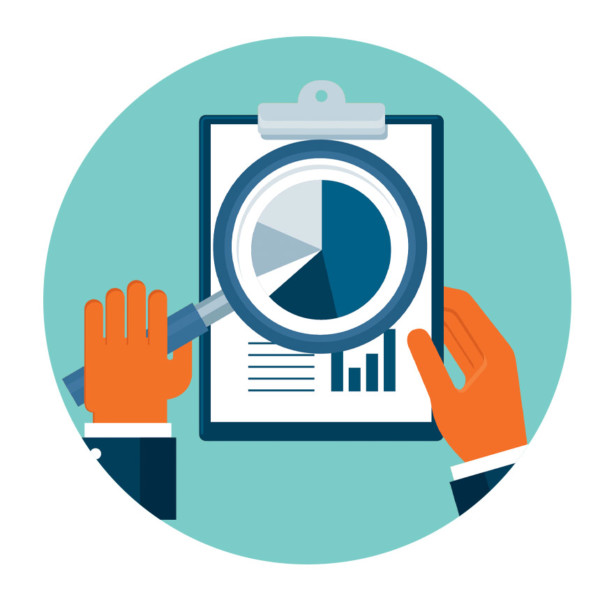
Do Your Research
Find out all you can about the company you’ve applied to. Check out the website for company history, products and services, day-to-day operations and business goals. Social media will also shed light, and a Google search will turn up any recent news. What is the company mission statement? What are its core values? Who are its competitors? Who are the key players? When you’re called for an interview, check LinkedIn for the skinny on the person conducting it.
Memorize The Job Description
You’ve already made sure that your knowledge, skills and experience are a good fit. It’s crucial that you link all those qualifications to the details in the job description. You can count on the interviewer having them memorized, so you should too.

Practice Answering Commonly Asked Questions
“Tell me about yourself.” If you’re prepared, this shouldn’t be the most dreaded request in the English language. Marcus is a big fan of the elevator pitch, and that’s the idea here. Practice introducing yourself, describing your skill set and experience, and explaining why you’d be an asset. Be energetic but concise. A good elevator pitch is around 20 to 30 seconds long.
As for responding to common questions, don’t just rehearse the answers in your head. Decide on the wording you’ll use, type out the answers, and practice saying them out loud. Have a friend or your significant other ask the questions in random order until the answers come naturally.
The interviewer probably won’t throw too many curve balls. Hiring managers have a fairly standard list of things they want to know. Here are some examples:
- “How did you hear about us? Why are you interested in this position and this company?”
- “Do you know who our competitors are?”
- “Why are you leaving your current job?”
- “What are your strengths and weaknesses? How do you resolve your own mistakes?”
- “What accomplishments are you most proud of?”
- “Where do you see yourself five or 10 years from now?”
- “Were you ever in a sticky situation? How did you navigate it, and what was the outcome?”
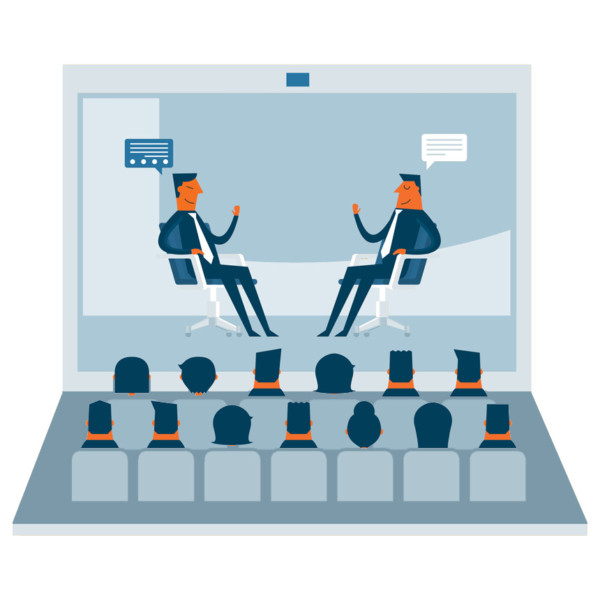
There are dozens of other samples on the internet, but you get the idea. In a first interview, you may or may not be asked about the salary you expect. There are several websites, such as Indeed, which offer a free salary calculator to give you a rough idea. Keep in mind that this is just a general guide, there are many differences in salaries based on location, size of company and level of responsibilities for the individual role.
Prepare Questions for the Interviewer
There’s no shame in asking questions about the company or the position you’re applying for. In fact, it shows that you’re thorough and genuinely interested.
- What does a typical day look like in the role you’re applying for?
- Will you collaborate or work independently?
- To whom will you report?
- What will you be expected to achieve in 30 days, six months or a year?
- What metrics are used to evaluate performance?
These are all things you must know in order to make an informed decision. Skilled interviewers encourage questions.
Organize Interview Materials
Assemble everything you’ll take with you to the interview. Print a dozen or so copies of your resume. You might be interviewed by a team or sent to meet various department heads you’ll be working with. On your own copy, highlight the accomplishments that are most relevant to this job. That way, you can see them at a glance if you feel like you’re floundering. Type up a list of references. Prepare to show or describe examples of your work. Locate a respectable-looking notebook and a couple of pens to take as well.

Know Exactly Where You’re Going
Map your route to the interview well in advance. Practice driving it until you’re familiar enough with the area to take an alternate route if need be. Keep an eye on your fuel gauge and the air in your tires in the days before the interview. You don’t want to show up disheveled or reeking of diesel.
Plan What You’ll Wear
This is not a decision to make on the morning of a 9:00 a.m. interview. You run the risk of suddenly remembering that your best blazer is at the dry cleaners. If you’re in doubt about what to wear, consider the job and the company. This is largely common sense. Don’t wear a polo to an interview for a funeral director’s job. A power suit probably won’t help you land a job as a rock music critic. If a recruiter arranged the interview, ask about the company dress code. In general, shoot for something a shade dressier than what’s expected. It’s far worse to be underdressed than overdressed. Avoid anything flashy or provocative. Keep your hairstyle, jewelry and makeup simple. Lay off the perfume or aftershave. Nothing should distract from your talent. Remember to schedule a haircut if necessary, and groom your facial hair if you’re getting shaggy.
If any of this sounds like obsessive over planning, you’re just not using your imagination. Anything could go wrong. Do you remember the last time you overslept and made a mad dash to work or the airport? Spare yourself the anxiety.
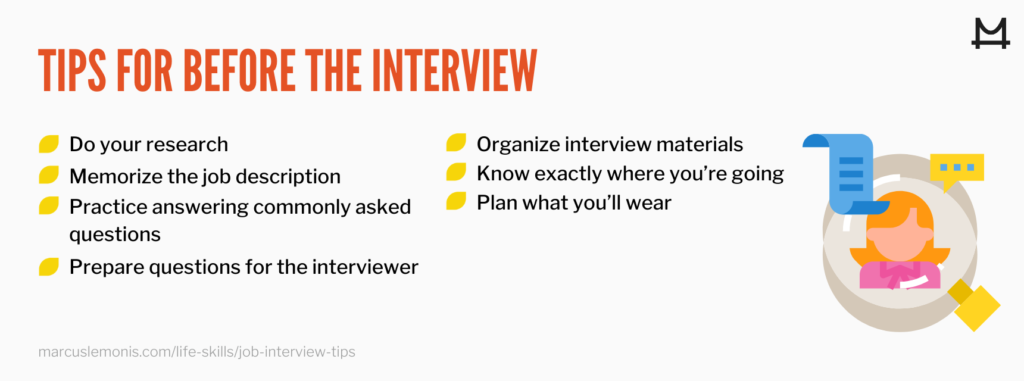
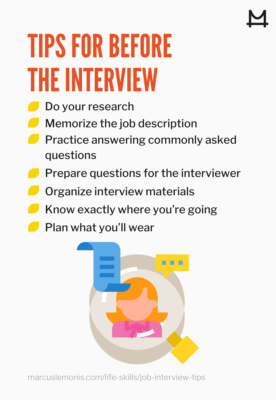
At The Interview
Make sure you have everything before you leave home: resumes, references, examples of your work, a notebook and pens. Turn off radio chatter in the car so you can focus. Do some deep breathing exercises on the way.
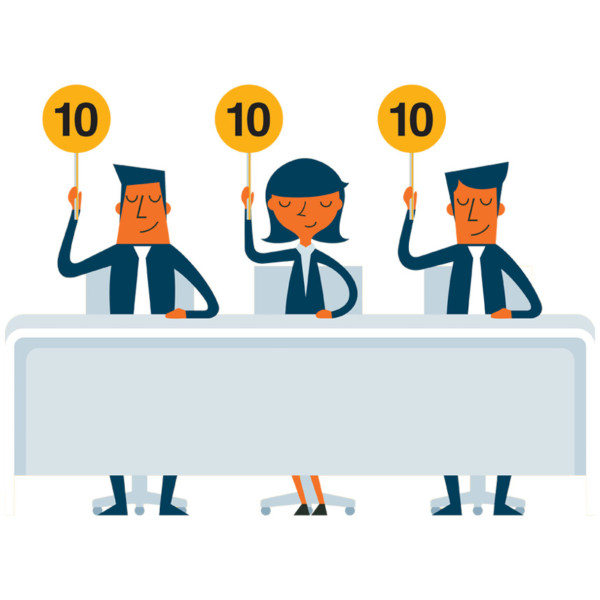
Make An Excellent First Impression
Being on time and looking sharp are vital to making a strong first impression. Plan to arrive 10 to 15 minutes early. Exude confidence and professionalism from the moment you drive into the parking lot. If you don’t quite feel unflappable enough to conquer the world, pretend that you do.
Treat everyone you encounter with friendliness and the utmost respect. You never know who may be asked for feedback about you, and you’ll probably be working with these people someday. As you wait, take in the overall vibe. Make sure you’d feel at home in this environment.
Actively Listen
When you’re called in, thank the interviewer for seeing you. Whenever your future boss is speaking, sit up straight, wear a pleasant expression, and maintain eye contact. Present yourself as approachable through your body language. For example, don’t fold your arms. Mind your manners and be polite. Use facial expressions and occasional nods to indicate that you’re listening. If needed, ask the interviewer if you can take a few notes, but take them quickly. You want to stay completely engaged and actively listen throughout your interview.

Speak Well For Yourself
Focus on your strengths and experience. Tie all your accomplishments back to that job description you memorized. Highlight your track record of ingenious business solutions.
Honesty is refreshing these days, so resist the temptation to exaggerate your abilities or experience. You shouldn’t apologize for shortcomings, but the interviewer might be impressed if you admit that you have a few things to learn. Whatever you do, don’t talk negatively about your current employer. Put a positive spin on the reasons for your job search: “That’s why I’m here. I love being challenged, and I feel like I’ve learned and achieved all that I can at my current job.”
Don’t try to be so professional that you come off as aloof or all-business. Relax. Be yourself. “Don’t compromise who you are,” says Marcus. You’ll make a better impression if you’re genuine and relatable. There’s more to this than filling a position. Employers are also trying to get a well-rounded mix of personalities. If you have a sense of humor, don’t hesitate to show it. If you have a hobby or passion that somehow relates to the job, bring it up in conversation: “Coaching little league has done more for my mentoring and team-building skills than the last three seminars I attended combined.”
Above all, be upbeat and confident.
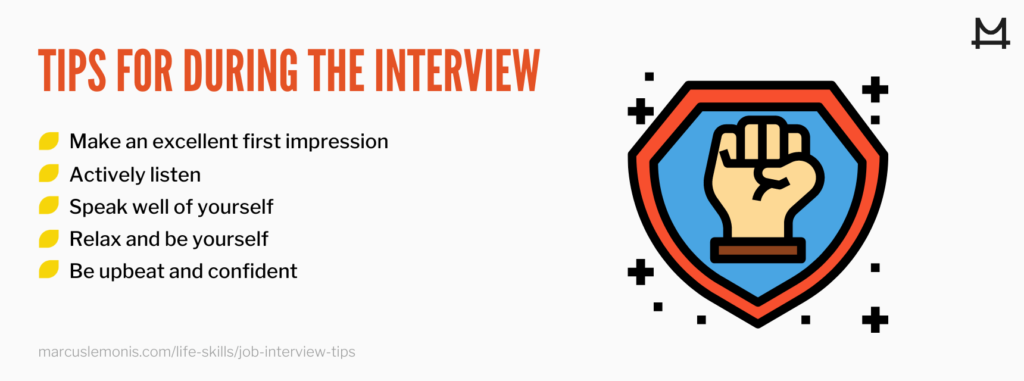
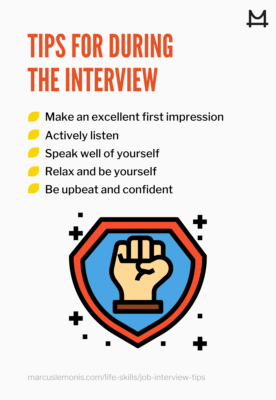
After The Interview
Before you leave, ask the interviewer if you can answer any more questions. Ask about next steps in the hiring process. Request a business card from everyone you spoke with, and follow up with personalized thank-you notes. These can generally be sent via email – make sure to send them out that day or the next. If the interviewer, or interviewers, requested any follow up information from you (such as contact information for additional references, portfolio samples, or the completion of an online assessment test), make sure to get these items back to them in a timely manner as well.
Finally, squeeze in a short getaway on the weekend. You’re going to be very busy very soon.
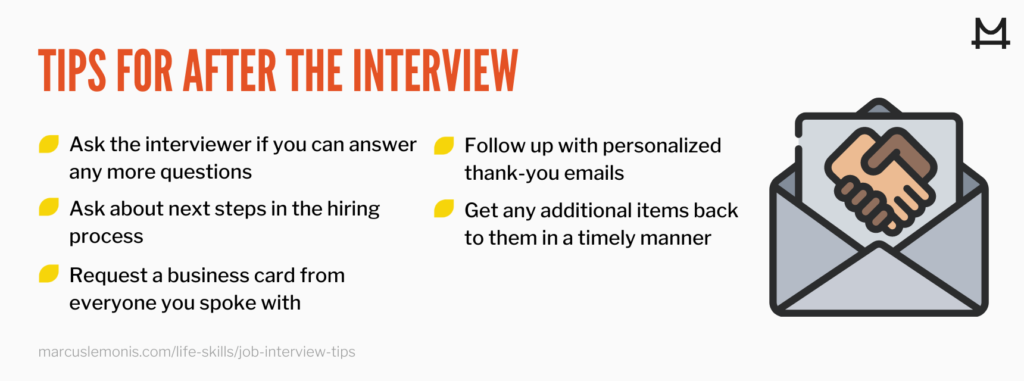
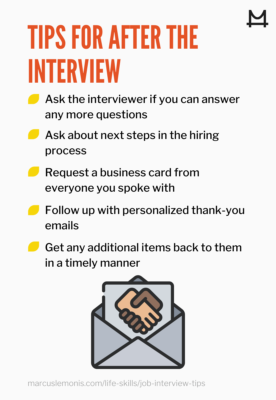
- How do you prepare for an interview?
- How do you stand out in an interview?





